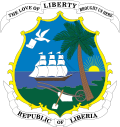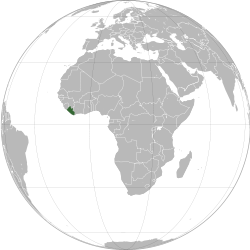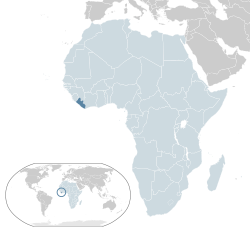Republic of Liberia | |
|---|---|
| Motto: "The Love of Liberty Brought Us Here" | |
| Anthem: "All Hail, Liberia, Hail!" | |
| Capital and largest city | Monrovia 6°19′N 10°48′W / 6.317°N 10.800°W |
| Official languages | English |
| Religion (2018) |
|
| Demonym(s) | Liberian |
| Government | Unitary presidential republic |
| Joseph Boakai | |
| Jeremiah Koung | |
| Richard Koon | |
| Sie-A-Nyene Yuoh | |
| Legislature | Legislature of Liberia |
| Senate | |
| House of Representatives | |
| Formation and Independence from American Colonization Society | |
American Colonization Society settlement | January 7, 1822 |
| July 26, 1847 | |
Republic of Maryland annexed | March 18, 1857 |
| January 6, 1986 | |
| Area | |
Total | 43,000 sq mi (111,370 km2) (102nd) |
Water (%) | 13.514 |
| Population | |
2024 estimate | 5,437,249 (120th) |
Density | 92.0/sq mi (35.5/km2) (180th) |
| GDP (PPP) | 2023 estimate |
Total | |
Per capita | |
| GDP (nominal) | 2023 estimate |
Total | |
Per capita | |
| Gini (2016) | 35.3 medium inequality |
| HDI (2022) | low (177th) |
| Currency | United States dollar (USD) Liberian dollar (LRD) |
| Time zone | UTC (GMT) |
| Date format | mm/dd/yyyy |
| Calling code | +231 |
| ISO 3166 code | LR |
| Internet TLD | .lr |
Website www | |
Table of Contents
Introduction to Pharmaceutical Regulations in Liberia
The realm of pharmaceutical regulation in Liberia is essential for safeguarding public health and ensuring the availability of safe and effective medicines. This regulatory framework is integral to managing the pharmaceutical industry in the country, addressing various challenges that may arise due to substandard medications and distribution practices. The purpose of these regulations is to oversee and enforce standards relating to the quality, safety, and efficacy of drugs available in the Liberian market.
The historical backdrop of drug regulations in Liberia dates back several decades, reflecting the country’s evolving approach to healthcare. Initially, there was limited oversight of pharmaceutical products, leading to widespread issues such as the circulation of counterfeit drugs and the administration of ineffective therapies. Recognizing these challenges, the government, in collaboration with international organizations such as the World Health Organization, made concerted efforts to strengthen the regulatory framework. This culminated in the establishment of the Liberia Medicines and Health Products Regulatory Authority (LMHRA), which is tasked with formulating policies, supervising drug registration, and monitoring pharmaceutical activities.
Pharmaceutical regulations are crucial not only for maintaining drug quality but also for fostering a trustworthy environment where health professionals and patients can access essential medications with confidence. The regulations provide clarity on the responsibilities and standards expected from manufacturers, importers, and healthcare providers, thus contributing significantly to overall health outcomes. Utilizing these regulations, Liberia aspires to create a safer public health landscape, one that prioritizes the well-being of its citizens against the backdrop of increasing globalization and complex healthcare needs.
Legal Framework Governing Pharmaceuticals in Liberia
The legal framework governing the pharmaceutical sector in Liberia is multifaceted, encompassing various laws, policies, and international agreements designed to ensure the safety, efficacy, and quality of pharmaceutical products. Central to this framework is the Public Health Law, which establishes the Ministry of Health as the primary regulatory body responsible for overseeing pharmaceuticals and healthcare services. This legislation sets forth the procedures for drug registration, inspection, and quality assurance.
In addition to the Public Health Law, Liberia adheres to international agreements such as the World Health Organization (WHO) guidelines and the African Medicines Regulatory Harmonization initiative. These international standards aim to create a consistent framework that facilitates the safe and effective use of medicines while enhancing cooperation among countries in regulating pharmaceuticals.
The Liberia Medicines and Health Products Regulatory Authority (LMHRA) plays a crucial role within this legal structure. Established to enforce pharmaceutical laws and regulations, the LMHRA is responsible for several key functions, including the evaluation and approval of drugs prior to their market entry, monitoring post-market surveillance, and ensuring compliance with national and international standards. Furthermore, the LMHRA works to combat counterfeit drugs and promote public awareness about the safe use of medicines.
The legal framework also includes policies related to good manufacturing practices (GMP), which are critical for maintaining high-quality pharmaceutical production standards. Regulations outlining the import and export of drugs are equally significant, ensuring that only approved medications enter and leave the country, thus protecting public health.
Overall, the legal framework governing pharmaceuticals in Liberia is designed to create a robust system of regulation and oversight that not only safeguards public health but also encourages a thriving pharmaceutical sector that can respond effectively to the needs of the population.
Drug Approval Processes in Liberia
The drug approval process in Liberia is a comprehensive and structured pathway that pharmaceutical companies must navigate to ensure that their products meet the necessary safety and efficacy standards before reaching the market. This process begins with pre-market evaluation, where companies engage in thorough research and development to assess the viability of their proposed drugs. This stage typically involves laboratory studies and experiments to generate significant preliminary data on drug interactions and potential effects.
Once the pre-market evaluation is complete, pharmaceutical companies are required to conduct clinical trials. These trials must adhere to strict ethical and scientific standards, often categorized into phases. Phase 1 trials focus on assessing the safety of the drug in a small group of healthy volunteers, while Phase 2 trials evaluate the drug’s effectiveness and side effects in a larger patient group. Phase 3 trials involve comparing the new drug against standard treatments on an even larger cohort to solidify the findings from earlier phases.
Upon successful completion of clinical trials, companies must submit a New Drug Application (NDA) to the regulatory authorities in Liberia. This application provides a comprehensive overview of data related to the drug, including manufacturing processes, clinical trial results, and proposed labeling. The regulatory body then undertakes a thorough review of the application, considering scientific and clinical evidence to evaluate the drug’s safety and efficacy for public use.
Timelines for the approval process can vary significantly, largely influenced by the complexity of the drug and the completeness of the NDA submission. Moreover, key requirements for drug registration typically involve rigorous documentation, including Good Manufacturing Practice (GMP) compliance and post-marketing surveillance plans. Overall, understanding these processes is vital for ensuring that pharmaceutical companies can successfully bring new medications to the Liberian market while adhering to the regulatory framework established for public health protection.
Manufacturing Standards in the Pharmaceutical Industry
The pharmaceutical industry in Liberia is governed by stringent manufacturing standards that ensure the quality and safety of medicinal products. At the core of these standards are Good Manufacturing Practices (GMP), which constitute a set of guidelines and regulations designed to minimize risks involved in pharmaceutical production. Compliance with these guidelines is essential for manufacturing facilities to maintain high quality and safety standards in their products.
GMP outlines specific requirements that pharmaceutical manufacturers must adhere to. This includes the design of facilities, the processes involved in production, and the qualifications of personnel. Facilities must be constructed in a manner that prevents contamination or mix-ups during production. For instance, separate and controlled environments for different stages of manufacturing are required, thus ensuring that the integrity of the pharmaceutical products is maintained throughout the process.
Moreover, manufacturing facilities are subject to regular inspections and audits by regulatory authorities. These inspections aim to verify compliance with GMP and ensure that all processes align with international standards. Manufacturers are required to have a comprehensive quality management system that documents procedures, specifications, and changes throughout the production cycle.
Certification is another critical aspect of pharmaceutical manufacturing in Liberia. Facilities must obtain necessary certifications from relevant authorities, which validate their compliance with GMP and international best practices. This not only enhances product credibility but also builds trust among consumers and healthcare professionals.
Ultimately, adhering to established manufacturing standards is vital in ensuring that pharmaceutical products produced in Liberia are of the highest quality. This adherence protects public health and fosters confidence in the efficacy and safety of medications available in the market. The integration of international guidelines into local practices further strengthens the regulatory framework and raises the standards of the pharmaceutical industry in Liberia.
Post-Market Surveillance and Pharmacovigilance
The processes of post-market surveillance and pharmacovigilance are critical components in ensuring the safety and efficacy of pharmaceutical products in Liberia. After the approval of a drug, monitoring for adverse drug reactions (ADRs) becomes essential. This ongoing vigilance allows for the detection of any potential safety concerns that may not have been evident during the pre-market trials. The regulatory framework in Liberia mandates that healthcare providers and pharmaceutical companies actively participate in monitoring the effects of medications once they are available to the public.
Healthcare providers play a pivotal role in this process. They are encouraged to report any ADRs they encounter while treating patients. This reporting is crucial as it helps build a comprehensive database of drug safety information. In Liberia, the National Medicines Regulatory Authority (NMRA) oversees these activities, providing guidelines on how to report ADRs effectively. Healthcare professionals are trained to recognize and document these reactions, ensuring that the information reaches regulatory authorities promptly. This knowledge sharing is fundamental in evaluating the ongoing risk-benefit profile of drugs used within the country.
Pharmaceutical companies also bear significant responsibilities in post-market surveillance. They are required by law to implement Pharmacovigilance systems that monitor the safety of their products post-approval. These companies must conduct periodic safety updates and ensure that their findings are communicated transparently to healthcare professionals and regulatory bodies. Moreover, they must maintain a robust reporting structure that allows both healthcare providers and patients to relay safety concerns back to them. This two-way communication bolsters collective efforts to uphold patient safety while monitoring the long-term impacts of medications on public health.
Ultimately, a collaborative approach involving regulatory authorities, healthcare professionals, and pharmaceutical companies is essential in maintaining a high standard for drug safety and efficacy. Through diligent post-market surveillance and pharmacovigilance practices, Liberia aims to protect its population from potential medication-related harm while fostering a safer healthcare environment.
Enforcement of Pharmaceutical Regulations
The enforcement of pharmaceutical regulations in Liberia is crucial for maintaining the integrity and safety of the pharmaceutical industry. The Government of Liberia, through various agencies, is responsible for ensuring that all pharmaceutical practices comply with established regulations. The Ministry of Health, alongside the Food and Drug Administration (FDA) of Liberia, plays a significant role in overseeing compliance and enforcement activities.
Inspections are a key component of the regulatory enforcement framework. Regular inspections of pharmaceutical manufacturers, distributors, and retail outlets are conducted to ensure that facilities operate within the guidelines set forth by regulatory authorities. These inspections assess factors such as sanitation, quality control procedures, and storage conditions of pharmaceutical products. Consequently, the FDA has the authority to issue citations or revoke permits if establishments fail to comply with regulatory standards.
In addition to routine inspections, compliance checks are carried out in response to specific concerns or complaints from the public. These checks provide an avenue for stakeholders to report unethical practices or potential violations. Moreover, the government has established a monitoring system that enables real-time surveillance of pharmaceutical activities. This system allows for the tracking of drug efficacy, safety, and adverse reactions, ultimately ensuring that pharmaceutical products distributed in the country meet the desired quality standards.
Furthermore, ongoing training and capacity-building initiatives for inspectors and regulatory officers are vital for enhancing the enforcement of pharmaceutical regulations. These programs equip personnel with the necessary skills to effectively interpret and enforce regulatory measures. Overall, a robust enforcement mechanism, encompassing inspections, compliance checks, and monitoring, is central to ensuring adherence to pharmaceutical regulations in Liberia, which in turn protects public health and promotes the responsible distribution of medicines.
Penalties for Non-Compliance in the Pharmaceutical Sector
In Liberia, the pharmaceutical sector is governed by a stringent regulatory framework aimed at ensuring public health and safety. Entities operating within this sector are expected to adhere to these regulations strictly. Non-compliance can lead to serious consequences, which serve as a deterrent against violations and an assurance of a reliable and safe drug supply.
One of the most immediate repercussions for pharmaceutical companies failing to comply with regulations is the imposition of substantial fines. These financial penalties can vary in magnitude based on the severity of the violation and the extent of non-compliance. Such sanctions not only serve to punish errant companies but also aim to recoup any damages caused to public health or safety as a result of their actions.
Additionally, license suspensions or revocations represent another critical penalty that companies may face. When regulatory authorities determine that a company is unfit to operate due to non-compliance, they may take the drastic step of suspending or revoking the company’s operating license. This action prevents the offending company from conducting any pharmaceutical business until they rectify the issues that led to the suspension, thereby reinforcing the importance of adhering to regulatory standards.
In more severe cases, non-compliance can lead to criminal charges against responsible individuals within a pharmaceutical organization. These charges may include, but are not limited to, fraud, negligence, and endangerment. Such legal actions underscore the gravity of maintaining compliance within the pharmaceutical sector and serve as a strong warning to other industry players about the potential consequences of neglecting regulatory responsibilities.
Ultimately, the penalties for non-compliance within Liberia’s pharmaceutical sector are designed to uphold the integrity of drug supply chains and protect public health. By imposing these stringent measures, regulatory bodies aim to cultivate a culture of responsibility and accountability within the pharmaceutical landscape, ensuring that adherence to laws and standards remains a priority for all stakeholders.
Challenges in Pharmaceutical Regulation in Liberia
The regulation of pharmaceuticals in Liberia encounters several significant challenges that hinder its effectiveness and overall impact on public health. One of the primary challenges is the limited resources available for regulatory bodies. These organizations often operate with insufficient funding and personnel, which restricts their capacity to perform inspections, enforce regulations, and conduct necessary research. As a result, pharmaceutical products may enter the market without thorough evaluation, posing potential risks to consumer safety.
Inadequate infrastructure further complicates the situation. Many regions in Liberia lack the necessary facilities and logistics to support the transportation, storage, and distribution of pharmaceutical products. This inadequacy not only leads to increased costs but also affects the quality of drugs, as improper storage conditions can compromise their efficacy and safety. The lack of modern technology and facilities limits the ability of regulatory authorities to monitor and control the pharmaceutical supply chain effectively.
Another pressing issue is the insufficient training of personnel involved in pharmaceutical regulation. Without adequate training and continuous professional development, regulatory staff may struggle to keep up with evolving industry standards and practices. This knowledge gap can result in inefficient assessments of pharmaceutical products and inadequate response to emerging public health concerns.
Enforcement of existing regulations presents additional challenges, as regulatory bodies often lack the authority or capacity to penalize non-compliance effectively. This weak enforcement can lead to a proliferation of counterfeit medications and substandard products in the market, which directly endangers public health. Together, these challenges illustrate the urgent need for comprehensive reforms in Liberia’s pharmaceutical regulation framework to enhance public safety and ensure the provision of quality healthcare to its citizens.
Future Directions for Pharmaceutical Regulations in Liberia
The landscape of pharmaceutical regulations in Liberia is poised for significant transformation in the coming years. As the nation seeks to improve public health outcomes, ongoing initiatives are being implemented to strengthen regulatory frameworks. The government, in collaboration with various stakeholders, is working diligently to enhance oversight, ensuring that pharmaceutical products meet stringent safety and efficacy standards. One of the key objectives is to align Liberia’s regulatory practices with internationally recognized standards, thereby fostering public confidence in the healthcare system.
Central to these future directions is the commitment to developing comprehensive legislation that governs the pharmaceutical sector. This involves streamlining procedures for drug registration, ensuring that all medications available in the market undergo rigorous evaluation for quality and safety. By adopting harmonized regulations that mirror global practices, Liberia can not only safeguard public health but also position itself favorably in the regional pharmaceutical market.
Technology and innovation will play a crucial role in enhancing the regulatory processes in Liberia. The integration of digital platforms into regulatory frameworks will facilitate real-time monitoring and reporting, improving the efficiency of drug approval processes. Furthermore, e-pharmacies and mobile health applications can enhance accessibility to pharmaceutical products, particularly in remote areas. This shift towards a more technology-driven approach will also enable better data collection, analysis, and communication between regulatory authorities and healthcare providers.
Capacity building is another priority, with plans in place to train regulatory staff in modern methodologies and technologies. By investing in human resources and infrastructure, Liberia aims to cultivate a robust regulatory environment that can effectively respond to emerging pharmaceutical challenges. Overall, the future of pharmaceutical regulations in Liberia looks promising, characterized by innovation, collaboration, and adherence to global best practices.



